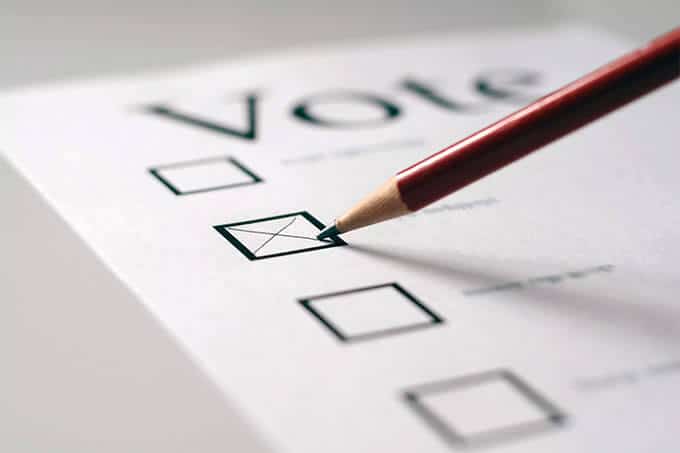Here’s a thought: Pens and pencils just may form the very foundation of democracy. But only certain kinds.
You see, the act of voting itself often relies on ordinary pen and paper in both the UK and the US, and the type of writing instrument used can be the difference between a ballot that’s counted and one that’s discarded.

(Paper ballots dominate voting in the United Kingdom, and account for an estimated 70 percent of elections in the United States.)
For example, there was a kerfuffle in the American state of New Mexico recently when state officials declared the Sharpie unfit for voting booths (Update: They didn’t declare it unfit, but acknowledged there had been complaints.) While they stopped just short of banning the markers all together, they did order nearly 900 boxes of Paper Mate Flair felt-tip pens and shipped them to polling places as replacements.

Check Price and Reviews on Amazon
The problem was that Sharpies were bleeding through the paper ballots.
It’s not the first time Sharpies have been trouble at the polls. In 2013, voters complained when the Sharpies they were given bled through their double-sided ballots in an election in New York. And in 2004, Sharpies were blamed for a miscount in Maricopa County, Arizona (although an expert later opined that voting machines were able to read Sharpies just fine, but could not read Bic ballpoint).
The concern over the types of pens – more specifically, the types of inks – used for paper ballots stems from the ability of machines to scan and read individual votes. Inks that show up too lightly, that easily smear over into other selections, or that bleed through the ballot can confuse the machines, causing a vote to go uncounted, or to count for someone other than the voter’s choice.
![]()
Check Price and Reviews on Amazon
That’s why many jurisdictions require voters to use No. 2 pencils or, if voters insist on ink, then black or blue ballpoint pens. New Mexico’s choice aside, elections officials typically forbid felt-tip markers and gel pens.
In the UK, pencils are the default ballot marking devices. Irish officials have said they prefer pencils simply because they are more reliable.

Image by The Sun “Pencils Used in Voting”
However, voters who supported the 2014 Scottish independence movement were worried before the September referendum that ballots cast in pencil were subject to tampering. “Yes” voters were encouraged to take their own ink pens to polls instead.
And that’s perfectly acceptable. The UK Electoral Commission’s guide “Dealing with doubtful paper ballots” instructs local governments to not rejects ballots simply because they are marked with something other than pencil.
Pencils are also the writing instruments of choice in Australian voting booths.
The provision of pencils in polling booths is a requirement of section 206 of the Electoral Act. There is, however nothing to prevent an elector from marking his or her ballot paper with a pen if they so wish. The AEC has found from experience that pencils are the most reliable implements for marking ballot papers. Pencils are practical because they don’t run out and the polling staff check and sharpen pencils as necessary throughout election day. Pencils can be stored between elections and they work better in tropical areas. The security of your vote is guaranteed as the storage and counting of ballots is tightly scrutinised.
Of course, pencils may not be a good idea in areas where voting security is a little more lax…or non-existent. Russia, Egypt and other democratically challenged countries have been having their own electoral problems involving pens with disappearing ink.
(Speaking of disappearing votes, erasable pens like the Pilot FriXion or the Uniball Fanthom probably would not be ideal for use on paper ballots.)
So next time you head to the polls, we suggest you grab your trusty No. 2 (or HB) pencil, a black ballpoint, or, if you’re really paranoid, a Uniball Jetstream with incorruptible ink.
And make sure you give your writing instrument the respect it deserves as a tool of free choice.